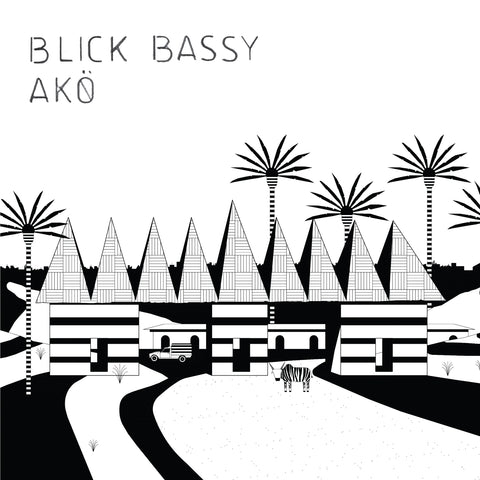Executive production by Laurent Bizot & Thibaut Mullings
Art Work: Neals Niat
Design: Element-S
Produced By Blick Bassy
Recorded by Florian Monchâtre at Studio Soyuz, Paris
Mixed by Florian Monchâtre in June 2014 at Studio Soyuz
Mastered by Benjamin Joubert at Studio Translab
Blick Bassy - guitar, vocals
Clément Petit - cello, banjo
Fidel Fourneyron - trombone
Nicolas Repac - Samples in Wap do Wap and One Love
Olivier Ker Ourio – Harmonica in Aké
All songs written & composed by Blick Bassy
Kiki, Aké et Wap do Wap arranged by Clément Petit
All songs published by Nø Førmat!
Written and sung by Blick Bassy - in Bassa, one of some 260 spoken languages in Cameroon - and accompanied by a unique ensemble of guitar, banjo, cello and trombone - Akö’s eleven sparklingly original tracks are a musical revelation. Remarkable then, to consider that these are recordings that were never intended for release. Bassy’s original idea was to get together with the cellist Clément Petit and trombonist Fidel Fourneyron (¿Que Vola?) to record a few songs in homage to his longtime hero Skip James. By chance, the studio they hired was directly below the offices of Nø Førmat!, the innovative French label run by Laurent Bizot, who happened to hear the results of this unlikely yet inspired musical alchemy. As Laurent relates, “when I heard the first song Aké, I was stunned. It sounded like a dream, so light, a voice floating in the sky. Production was minimal but bold and the music had a feel not often heard with African songwriters. They had taken risks they probably wouldn’t have done if the music was meant for release. The lack of budget, the time restraints and the restriction to three musicians has conjured something entirely unique and very fresh. Exactly what I like!”
Encouraged by Bizot to record more, the three musicians emerged from the seven-day session with the makings of an album that amounts to the most personal of Bassy’s career. As with the rasping trombone that evokes the familiar whistle of a transcontinental train on Kiki, this album speaks of Bassy’s separation from and connection with home. Sung in Bassa, a language and tradition that he has long championed, Bassy sings of the village he grew up in rural Cameroon - drawing connections between the itinerant musicians of his childhood with journeyman blues legend Skip James. While the influence of the Malian folk of Ali Farka Toure can be detected on Tell Me and Mama, and the complex melodic patterns betray his Cameroonian roots throughout, this is an album that makes subtle references to a musical palette that ranges from the Gypsy Swing flavours of Wap Do Wap to the sparse and haunting singer songwriter classic in the making Ndjèl.




